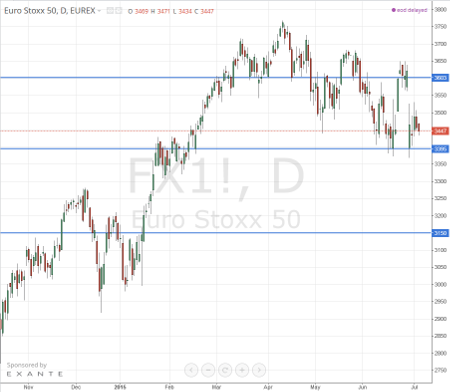Goldman Sachs predicts impact of Greek vote on share prices
3rd July 2015 14:00
by Lee Wild from interactive investor
Share on
Everyone has a view on Greece right now. Goldman Sachs, as you would expect, is no different. Support has shifted toward the "yes" vote in favour of keeping the euro ever since Greek banks were closed on Monday. The broker thinks Greece will stay in the Eurozone whatever the outcome, but the initial swing in equity markets next week could still be dramatic.
Forget the opinion polls, they're unreliable, says Goldman's chief European economist Huw Pill. "On balance we see a 'Yes' outcome as more likely. The closure of the banks and resulting liquidity squeeze on the Greek private sector has served to concentrate voters' minds on the gravity of the situation, bringing the broader question of Greece's place in Europe to the fore and thus ultimately favouring a 'Yes' vote."
Pill envisages three main scenarios. A "Yes" vote, followed closely by the resignation of Tsipras and Varoufakis and the formation of a new Greek government, is the most market-friendly outcome. A "Yes" vote, with the current government seeking to remain in power would likely lead towards a rapprochement with creditors, while a "No" vote would not necessarily imply a definitive "Grexit".
"In short, across the spectrum of scenarios sketched out above, our base case is that: (a) eventually there will be political change in Greece; and (b) this political change will ultimately lead in the direction of Greece reaching a new accommodation with its creditors that preserves Euro membership."

Source: TradingView
But what does all this mean for equity markets?
In an attempt to find out, Goldman uses both sovereign spreads - the Eurostoxx index is still highly correlated with sovereign spreads in Italy and Spain - and equity risk premium.
"Our best estimate for the worst-case downside in the equity market in Europe on a 'No' vote is a move to around 3,150 on SX5E [around 10% and an 18-month low], although we think this would be short-lived as ECB intervention would kick in and investors would then focus on improving fundamentals," says Goldman's chief global strategist Peter Oppenheimer.
"For fundamental investors, any further meaningful correction should be seen as a buying opportunity as ECB intervention and low micro connectivity would reduce fundamental contagion. We would focus in particular on DAX, IBEX and MIB as buying opportunities on weakness as these are among our key recommended overweights from a strategic perspective."
"A 'Yes' vote followed by an accommodation between the Greek authorities and the institutions would likely see equities back up to April highs of around 3,830 on Eurostoxx 50 [approximately 10% and a seven-year high]."
This article is for information and discussion purposes only and does not form a recommendation to invest or otherwise. The value of an investment may fall. The investments referred to in this article may not be suitable for all investors, and if in doubt, an investor should seek advice from a qualified investment adviser.